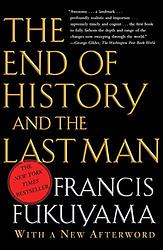The End of History and the Last Man by Francis Fukuyama
This book presents a provocative exploration of the evolution of political systems and the role of liberal democracy in the global landscape. The author argues that the progression of history, as defined by the development of political and economic systems, has culminated in liberal democracy and free-market capitalism. This, he suggests, may represent the endpoint of mankind's ideological evolution and the 'end of history'. The book also discusses the concept of 'the last man' as a potential consequence of this endpoint, exploring the existential threat of a society of 'last men' devoid of ideological struggle and dominated by materialistic gratification.
The 2766th greatest book of all time
Ranking Details:
Our ranking system awards points to books based on their appearance and position on curated lists. Here's how it works:
Unranked Lists: For lists without specific rankings, each book receives points equivalent to the list's weight. This approach recognizes the book's inclusion on prestigious lists.
Ranked Lists: Books on ranked lists receive points in two ways:
- Base Points: Initially, every book is awarded points equal to the list's weight, acknowledging its significance.
- Bonus Points: Additionally, books earn bonus points based on their ranking. The total bonus pool, equal to 100% of the list's weight, is distributed among the books, with higher-ranked books receiving more points.
Exponential Distribution: The distribution of bonus points follows an exponential model. This means the top-ranked book (#1) receives significantly more bonus points than those further down the list (e.g., #100). Our algorithm ensures that higher placements are rewarded more generously, reflecting the achievement of a top rank on any given list.
This scoring system ensures that each book's ranking reflects both its presence on multiple lists and its positions within those lists, providing a comprehensive measure of its acclaim and popularity.
Total Points: 186
Since this book was first published in 1992, there is a penalty of 28.8%. The age adjusted score is 132.43.
This is to prevent newer books from reaching super high on the ranked list of the greatest books of all time. The greatest books should also stand the test of time.
- score: 141 -- The 100 Best Non-Fiction Books of the Century (Weight: 138)
- score: 45 -- The Well-Educated Mind (Weight: 45)

